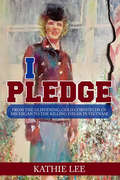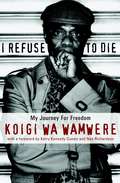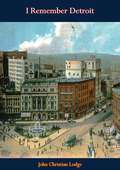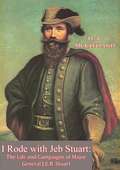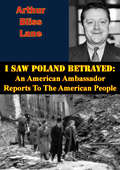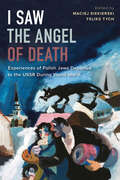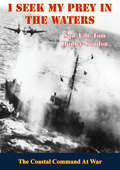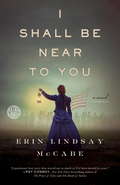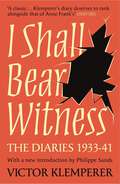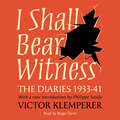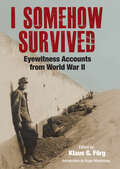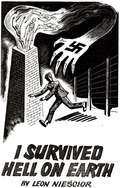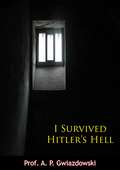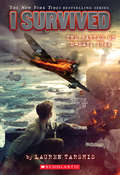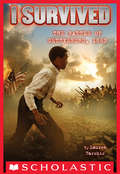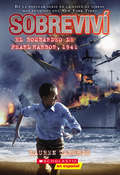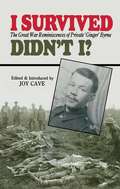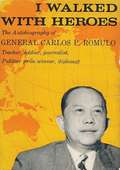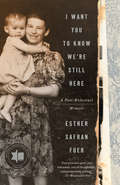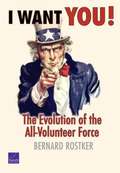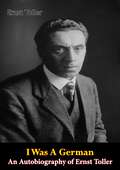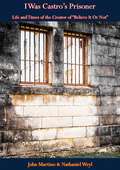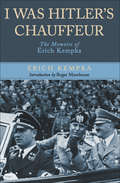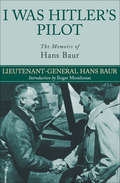- Table View
- List View
I Pledge: From the glistening, gold cornfields of Michigan to the killing fields in Vietnam
by Kathie LeeI Pledge is well written, taking the reader on a unique journey through the painful Vietnam years. Kathie Lee, a young woman in the military, presents a fascinating story through the eyes of a small-town girl forced to grow up in a hurry. As Kathie's perceptions of honor, duty, and national interest are challenged, the reader is held captive. I Pledge is the first account I have seen which addresses those years effectively from a female perspective. Governor Jay Hammond, State of Alaska's two term Governor. He was a great encouragement to me in writing this novel before his passing. I Pledge is a wholesome, touching reading set in a serious era of America's history – the Vietnam War. It is carefully detailed, fast moving and even humorous. It also conveys values that will see people through both national and personal crises. Many will appreciate and benefit from I Pledge. Franklin Graham, President of the Billy Graham Evangelical Association and Samaritan's Purse Kathie Lee's book is a mind stimulating adventure of the time she spent in the military and the events she noted during the Vietnam War. I Pledge made me reflect on my time in the U.S. Marine Corps boot camp during 1964 and my combat tours of duty in Vietnam during 1967, 68, 69 and 70. It reminded me of the good times I spent with my comrades-in-arms and our everlasting friendships, and the bad times of having to experience the tragedy of a war-torn country, Vietnam. Butch Meriwether, U.S.M.C. Gunnery Sergeant, Retired In more than 20 years of friendship we have heard many stories from Kathie Lee about her experiences in the military, specifically the Vietnam era. We were in the first generation who sat around the dinner table and watched the daily televised unfolding of a war we didn't understand. Hearing about the war from the perspective of veterans who have a passion for their country and for our military has truly been an eye-opening privilege. Perhaps no other era of veterans has dealt with so much controversy and so little honor. As educators, we feel I Pledge is a ‘must read' for teachers and students to get an a accurate understanding of the Vietnam War period, and the sacrifices made by so many. Gary and Jill Leiter, Educator
I Refuse to Die: My Journey For Freedom
by Kerry Kennedy Nan Richardson Koigi Wa WamwereAn extraordinary account of how a laborer's son rose to challenge the power of despots, I Refuse to Die is both the autobiography of one gifted man who rose above the horrors of colonization, and an uncensored history of modern Kenya. The book is infused with the freedom songs of the Kenyan people, as well as dream prophecy and folk tales that are part of Kenya's rich storytelling tradition. Tracing the roots of the Mau Mau rebellion, wa Wamwere follows the evolution and degeneration of Jomo Kenyatta and the rise of Daniel arap Moi.In 1979, wa Wamwere won a seat in the parliament, where he represented the economically depressed Nakuru district for three years. An outspoken activist and journalist, wa Wamwere was framed and detained on three separate instances, spending thirteen years in prison, where he was tortured but not broken. His mother and others led a hunger strike to free him and fellow political prisoners. Their efforts brought about a show trial at which Koigi was sentenced to four more years in prison and "six strokes of the cane," and escaped Kenya--and probably execution--only through the exertions of human rights groups and the government of Norway.
I Remember Detroit
by John Christian LodgeHere are the memoirs of a man who has since grown up with Detroit since the first years of the Civil War and who was intimately associated with its business, athletics and government over a long period. Mr. Lodge is now (at the time of writing his memoirs) eighty-seven years old and recalls in his book the tremendous transformation that has occurred in this, the city of his birth, the skyline, the streets, the buildings, the manufactories, the wholesale and retail businesses. He recalls early athletics in Detroit, when the chief sport of the young men was rowing, the organisation of the Detroit Athletics Club—he is one of the founders and the oldest living member—and the beginnings of both amateur and professional baseball—he himself played until late in life., he watched the present city hall being erected in 1871 and has been almost continuously associated with it since, in one way or another, as reporter and city editor of Detroit Free Press, as Alderman and Councilman, as president of the Council and as mayor.I remember Detroit will appeal to all citizens of Detroit and Michigan, for the narrative itself and for the interesting and informative sidelights it throws upon the life of the city and its industrial and political leaders of a by-gone era.
I Rode with Jeb Stuart: The Life and Campaigns of Major General J.E.B. Stuart
by Burke Davis H. B. McclellandMajor-General J.E.B. Stuart (1833-1864) was one of the Confederacy’s greatest horsemen, soldiers, and heroes. As early as First Manassas (Bull Run) he contributed significantly to the Confederate victory, he subsequently displayed his daring and brilliance in the battles of Second Manassas, Antietam, Fredericksburg, Chancellorsville, and Brandy Station—the most significant cavalry battle of the war, and Stuart’s finest moment. General Lee depended on Stuart for knowledge of the enemy for, as he said, Stuart never brought him a piece of false information. But Stuart was mortally wounded at Yellow Tavern in May, 1864. Not since the death of Stonewall Jackson had the South sustained so great a personal loss, his rollicking, infectious gaiety and hard fighting were sorely missed in the grim last days of Lee’s army.By all accounts, I Rode with Jeb Stuart is the most reliable and persuasive portrait of Stuart offered by a contemporary, and is indispensable for any thorough knowledge of the great Confederate cavalryman.“This book, which is both biography and memoir, is the richest source on the Civil War career of the plumed knight of the Army of Northern Virginia, Major-General James Ewell Brown Stuart. Though it has been out of print for generations, it is still read, and has fairly won its way onto the shelf of ‘classics’ of the war....It is by all odds the most reliable account of Stuart and his horsemen left by Stuart’s intimates....A reader who rides with Stuart through the Gettysburg campaign, until the Confederate infantry is safely south of the swollen Potomac, is not likely to forget the experience. In the light of McClellan’s narrative the ancient, wearying Confederate controversies over Gettysburg seem to lose a great deal of their importance.”—Burke Davis, Introduction, I Rode with Jeb Stuart
I Saw Poland Betrayed: An American Ambassador Reports To The American People
by Arthur Bliss LaneArthur Bliss Lane was a hugely experienced American Diplomat, having worked all over the world before his posting to the Polish Government in 1944. The Polish Government was then in exile in London and he gained a great deal of respect for the Polish leadership. He followed them back to their homeland in 1945 as the Poles sought to set-up a democratic state from the smashed debris of years of Nazi domination. What transpired was a new form of despotism in Soviets, in this memoir Bliss gives a detailed history of Poland from 1944-1947, the post-war border changes and the Soviet creation of a puppet state in Poland after WWII. In Bliss’ view the Poles were hung out to dry by the Allies after 1945 and his memoir provides compelling evidence of this.
I Saw the Angel of Death: Experiences of Polish Jews Deported to the USSR during World War II
by Maciej Siekierski and Feliks TychDuring World War II, several hundred thousand Polish citizens were deported from their homeland by Soviet authorities and sent to the gulag; many died there. For over 60 years, the Hoover Institution Library & Archives has preserved the testimonies of more than 30,000 Polish survivors. Among these are 171 accounts of Polish Jews who suffered both German and Soviet occupation; were transported hundreds or thousands of miles to suffer again in brutal Soviet forced-labor camps; and were eventually released, escaping to the Middle East. Now, these testimonies are collected for the first time in a scholarly English translation. The accounts—recorded shortly after the events they describe, with witnesses' memories still fresh—reveal many of the systematic horrors of World War II, clearly indicating the genocidal essence of the Soviet camp system and illustrating its mechanisms. They offer extraordinary information and insight on the activities of the Polish resistance movement, Jewish religious and community life, working conditions, the experiences of women and children, and more. These testimonies form a vital historical record of systemic human brutality that should never be forgotten. But they also paint a portrait of unwavering perseverance amid the struggle for survival.
I Seek My Prey In The Waters: The Coastal Command At War
by Sqn. Ldr. Tom Dudley-Gordon Air Chief Marshal Sir Philip Bennet Joubert de la FertéTHE beginnings of Coastal Command are obscure. It is held by some that, in embryo, it consisted of five officers and four Bleriot monoplanes that were detached from Netheravon in August 1914 for coastal reconnaissance duties. At this time, however, there was a flourishing Naval Air Service which had its being up and down our coasts and which could properly be regarded as a coastal air force...In 1918 the Royal Flying Corps and the Royal Naval Air Service were amalgamated into the Royal Air Force. By this time there were many aircraft of all sorts employed on coast-watching, convoy protection and the attack of submarines, and very effectively they carried out their duties.After the war this coastal organization was much reduced in size, being composed of a few flying-boat squadrons and one or two torpedo-carrying units. In addition, the disembarked squadrons of the carrier-borne air force were controlled and administered by what was then known as the Coastal Area. When, however, under the menace of Hitlerism, the expansion of the Royal Air Force took place, Coastal Area, by that time renamed Coastal Command, took its share. Working in close co-operation with the Royal Navy, the Command developed the activities which are so well described in this book.Coastal Command has always been a rather independent part of the Royal Air Force. Its operations have an element of mystery about them which is a trifle aggravating to the rest of the Service. It has a jealous spirit of its own which makes its personnel, when they are posted away, hanker to come back and strive and contrive to that end unceasingly. It is immensely proud of its job and of the way it does it. In fact, it has all the attributes of a first-class team. Long may it flourish as such.
I Served on Bataan
by Juanita RedmondThe true story of an Army nurse trapped in the Philippines during the beginning of America's entrance in WWII.
I Shall Be Near to You
by Erin Lindsay MccabeAn extraordinary novel about a strong-willed woman who disguises herself as a man in order to fight beside her husband, inspired by the letters of a remarkable female soldier who fought in the Civil War. Rosetta doesn't want her new husband Jeremiah to enlist, but he joins up, hoping to make enough money that they'll be able to afford their own farm someday. Though she's always worked by her father's side as the son he never had, now that Rosetta is a wife she's told her place is inside with the other women. But Rosetta decides her true place is with Jeremiah, no matter what that means, and to be with him she cuts off her hair, hems an old pair of his pants, and signs up as a Union soldier. With the army desperate for recruits, Rosetta has no trouble volunteering, although she faces an incredubous husband. She drills with the men, proves she can be as good a soldier as anyone, and deals with the tension as her husband comes to grips with having a fighting wife. Rosetta's strong will clashes with Jeremiah's while their marraige is tested by broken conventions, constant danger, and war, and she fears discovery of her secret even as they fight for their future, and for their lives. Inspired by more than 250 documented accounts of the women who fought in the Civil War while disguised as men, I Shall Be Near To You is the intimate story, in Rosetta's powerful and gorgeous voice, of the drama of marriage, one woman's amazing exploits, and the tender love story that can unfold when two partners face life's challenges side by side.From the Hardcover edition.
I Shall Bear Witness: The Diaries Of Victor Klemperer 1933-41
by Victor KlempererA publishing sensation, the publication of Victor Klemperer's diaries brings to light one of the most extraordinary documents of the Nazi period.'A classic ... Klemperer's diary deserves to rank alongside that of Anne Frank's' SUNDAY TIMES'I can't remember when I read a more engrossing book' Antonia Fraser'Not dissimilar in its cumulative power to Primo Levi's, is a devastating account of man's inhumanity to man' LITERARY REVIEWThe son of a rabbi, Klemperer was by 1933 a professor of languages at Dresden. Over the next decade he, like other German Jews, lost his job, his house and many of his friends.Klemperer remained loyal to his country, determined not to emigrate, and convinced that each successive Nazi act against the Jews must be the last. Saved for much of the war from the Holocaust by his marriage to a gentile, he was able to escape in the aftermath of the Allied bombing of Dresden and survived the remaining months of the war in hiding. Throughout, Klemperer kept a diary. Shocking and moving by turns, it is a remarkable and important account.
I Shall Bear Witness: The Diaries Of Victor Klemperer 1933-41
by Victor KlempererA publishing sensation, the publication of Victor Klemperer's diaries brings to light one of the most extraordinary documents of the Nazi period.'A classic ... Klemperer's diary deserves to rank alongside that of Anne Frank's' SUNDAY TIMES'I can't remember when I read a more engrossing book' Antonia Fraser'Not dissimilar in its cumulative power to Primo Levi's, is a devastating account of man's inhumanity to man' LITERARY REVIEWThe son of a rabbi, Klemperer was by 1933 a professor of languages at Dresden. Over the next decade he, like other German Jews, lost his job, his house and many of his friends.Klemperer remained loyal to his country, determined not to emigrate, and convinced that each successive Nazi act against the Jews must be the last. Saved for much of the war from the Holocaust by his marriage to a gentile, he was able to escape in the aftermath of the Allied bombing of Dresden and survived the remaining months of the war in hiding. Throughout, Klemperer kept a diary. Shocking and moving by turns, it is a remarkable and important account.
I Somehow Survived: Eyewitness Accounts from World War II
by Klaus G. Förg“The selection of remembered events from a cross section of Germans provides a very human account of instances in war.” —FiretrenchThe first in a series of books, I Somehow Survived is an extraordinary collection of true stories giving testimony to those who survived World War II. Based on interviews with numerous veterans from across the spectrum of wartime experience, the book documents and reflects upon one of the most gruesome times in history.From anti-partisan warfare in the French mountains and atrocities in East Prussia to the experience of a Norwegian concentration camp, the accounts include rarely heard stories from a range of people caught up in the war. With the distance of time, these survivors have been able to offer new perspectives on their experiences and expose truths they would not have dared admit several decades ago.German Army officers reveal their role in the Vercors and Kiev massacres. A Luftwaffe officer-applicant who never flew describes service on the ground. And a Norwegian woman writes of marrying a German Kriegsmarine while her mother was in a Norwegian concentration camp for political activity and her father was in hiding from the Gestapo. “I have no objection to your marrying him,” her father told her, “I just want them to give us our country back.”“It is always refreshing to hear the German side of the story. The recollections seem pretty open and candid, and the supporting photos help reassure one . . . fascinating stuff.” —A Question of Scale
I Survived Hell On Earth [Illustrated Edition]
by Leon NiesciorIncludes 204 photos, plans and maps illustrating The HolocaustOn the 8th of May 1940 Leon Niescior was arrested by the Gestapo at his home in occupied Poland. He had been guilty of small-time political agitation as a part of the Polish Underground movement; but the full weight of the Nazi secret police bore down on him for his helping a Jewish girl escape a death sentence. Beaten and tortured at Lublin prison, he was sentenced to serve his time at Auschwitz, a death sentence that somehow he survived. Filled with the details of the horrendous conditions of Auschwitz, the author relates his time spent under the brutal SS regime for political prisoners in this autobiography. Witness to the gas chambers, selections and casual barbarism of Auschwitz-Birkenau close by, that claimed so many lives, Nieiscor endured beatings that knocked out his teeth, starvation that left him a shell of himself, this is not for the faint-hearted.
I Survived Hitler’s Hell
by Prof. A. P. GwiazdowskiVivid and powerful World War II memoirs by Polish-American mechanical engineer Aleksander Gwiadzdowski, who spent several years in German prisons in East Prussia from 1941-1945.
I Survived the Battle of D-Day, 1944 (I Survived #18)
by Lauren TarshisIt was a battle that would change the course of World War II... New York Times bestselling author Lauren Tarshis commemorates the Normandy landings in this pulse-pounding story of the largest seaborne invasion in history.Eleven-year-old Paul’s French village has been under Nazi control for years. His Jewish best friend has disappeared. Food is scarce. And there doesn’t seem to be anything Paul can do to make things better.Then Paul finds an American paratrooper in a tree near his home. The soldier says the Allies have a plan to crush the Nazis once and for all. But the soldier needs Paul’s help.This is Paul’s chance to make a difference. Soon he finds himself in the midst of the largest invasion in history. Can he do his part to turn horror into hope?New York Times bestselling author Lauren Tarshis tells the story of the battle that became the foundation for the Allied victory in World War II. Includes a section of nonfiction backmatter with more facts about the real-life event.
I Survived the Battle of Gettysburg, 1863 (I Survived #7)
by Lauren TarshisThe bloodiest battle in American history is under way . . .It's 1863, and Thomas and his little sister, Birdie, have fled the farm where they were born and raised as slaves. Following the North Star, looking for freedom, they soon cross paths with a Union soldier. Everything changes: Corporal Henry Green brings Thomas and Birdie back to his regiment, and suddenly it feels like they've found a new home. Best of all, they don't have to find their way north alone--they're marching with the army.But then orders come through: The men are called to battle in Pennsylvania. Thomas has made it so far . . . but does he have what it takes to survive Gettysburg?
I Survived the Bombing of Pearl Harbor, 1941 (Sobreviví)
by Lauren Tarshis¡Los momentos más escalofriantes de la historia cobran vida en la serie de ficción Sobreviví! ¿Serás capaz de sobrevivir... al bombardeo de Pearl Harbor?Danny Crane, de once años, está solo en su playa favorita de Hawaii mientras el mundo se derrumba y la Segunda Guerra Mundial alcanza oficialmente a Estados Unidos. ¿Será el niño capaz de encontrar el camino a su casa en medio de las bombas, el humo y la destrucción del día que vivirá en la infamia?History's most terrifying moments are brought vividly to life in the action-packed fictional I SURVIVED series! Do you have what it takes to survive ... the bombing of Pearl Harbor?Eleven-year-old Danny Crane is alone on his favorite beach in Hawaii when the world is torn apart and World War II officially hits the United States. Does he have what it takes to find his way home in the midst of the bombs, the smoke, and the destruction of the day that will live in infamy?
I Survived, Didn't I?: The Great War Reminiscences of Private 'Ginger' Byrne
by Joy Cave4124 Private Byrne, C,. 2nd Battalion the Hampshire Regiment, latterly transferred to the Machine Gun Corps; served Egypt, 1915; France and Belgium, 1916–1918; Germany 1918–1919; honourably discharged, 1919. Behind that bold statement lies a remarkable account of en infantrymans service on the Western Front during the Great War. Charlie 'Ginger' Byrne was a typical young volunteer soldier of 1915, a soldier's son seeking a part in what seemed a great adventure. If his experiences may be said to mirror those of thousands of others, his account stands out from so many because it is set down in the authentic voice of the soldier. Unlike hundreds of thousands of his contemporaries, Charlie Byrne survived into old age. Sound in body and mind, and blessed with almost total recall, he was persuaded to tell his tale to an interested, informed, and acute listener. Now Joy Cave has triumphantly made the transition into print of Charlie's war. It is not a tale of strategy, a recital of epic heroism, but a trench's-eye view of the great tragedy. In that, it perhaps conveys a truth that may sometimes elude the literary memoirists, the heroes and commanders, even the ever rising tide of Great War historians. All have had their say, and more; Charlie Byne speaks for the lost thousands who, for whatever reason, never had a voice. In the often searing descriptions of going into the action with the Newfoundland Regiment on the Somme on 1st of July 1916 (and he was one of the very few survivors of that doomed advance near Beaumont-Hamel); of a catastrophic gas attack in the Ypres Salient; of raids, wiring -and ration- parties; of work details and transport duties; of front line and reserve trenches, and life in billets behind the lines; of the endless incomprehensible moves, and the shattered landscapes of France and Flanders; of the ever-present dangers and the ever present evidence of their effects- there shines through the chaos the good humour and forbearance of the soldier who fought and survived. There is much to be learned from Private Bryne about tolerance and the virtue of simple humanity. He adds to the cataract of words about the Great War his own his own drop of impish comprehension; in doing so, his narrative forms an excellent counterpoint to the reminiscence and other writings that that form the litany of the First World War. Gallant, proud humorous, and enduring, Charlie Byrne reminds us that wars are fought by ordinary people, but that in each of them there is always something extraordinary.
I Walked With Heroes
by Carlos P. RómuloI Walked with Heroes is an autobiographical book written by Carlos P. Romulo, a former Philippine general, journalist, poet, story writer, diplomat, former resident commissioner to Washington, D.C., former Philippine ambassador to the United States, and former President of the United Nations General Assembly.In I Walked with Heroes, Romulo personally reviewed his boyhood, early life, school days, and career in which he presented the facts and events with "frankness, intimacy, sense of person-to-person communication". It included Romulo's memories of his parents and the first time he met the Americans in the person of soldiers stationed in Camiling, his native town in Tarlac. The time was during the Philippine War of Independence. The nameless soldier taught Romulo and other Filipino boys how to read and write in English using Edward Baldwin's Primer. Romulo also narrated his life in Manila when he was both a morning-time student and an evening-time news reporter. A part of the book mentioned how Romulo was praised by then President of the Philippine Senate Manuel L. Quezon after writing a news item against Quezon's political opponents. In the pages of the autobiography, the reader would find that Romulo was comfortable in employing humor such as "telling jokes on himself", particularly in reference to his height to make the reader enjoy his writing. The book revealed Romulo's "unfailing faith in mankind".
I Want You to Know We're Still Here: A Post-Holocaust Memoir
by Esther Safran Foer&“A beautiful exploration of collective memory and Jewish history.&”—Nathan Englander&“Esther Safran Foer is a force of nature: a leader of the Jewish people, the matriarch of America&’s leading literary family, an eloquent defender of the proposition that memory matters. And now, a riveting memoirist.&”—Jeffrey Goldberg, editor in chief of The Atlantic Esther Safran Foer grew up in a home where the past was too terrible to speak of. The child of parents who were each the sole survivors of their respective families, for Esther the Holocaust loomed in the backdrop of daily life, felt but never discussed. The result was a childhood marked by painful silences and continued tragedy. Even as she built a successful career, married, and raised three children, Esther always felt herself searching. So when Esther&’s mother casually mentions an astonishing revelation—that her father had a previous wife and daughter, both killed in the Holocaust—Esther resolves to find out who they were, and how her father survived. Armed with only a black-and-white photo and a hand-drawn map, she travels to Ukraine, determined to find the shtetl where her father hid during the war. What she finds reshapes her identity and gives her the opportunity to finally mourn. I Want You to Know We&’re Still Here is the poignant and deeply moving story not only of Esther&’s journey but of four generations living in the shadow of the Holocaust. They are four generations of survivors, storytellers, and memory keepers, determined not just to keep the past alive but to imbue the present with life and more life.
I Want You! The Evolution of the All-Volunteer Force
by Bernard D. RostkerShould the U.S. reinstate the draft? With this inside look at the Pentagon and the White House, the author reviews the American military's transformation over the past thirty years into the world's finest fighting force, and describes why the volunteer force is still the best strategy for our national security. A vast archive of government documents on DVD allows readers to view exchanges between government officials at the highest level-including formally classified memorandum between Presidents and Secretaries of Defense-revealing for the first time the inner story of the All-Volunteer Force.
I Was A German: An Autobiography of Ernst Toller
by Ernst TollerThis is the fascinating autobiography of Ernst Toller. Ernst Toller (1893 - 1939) was a German left-wing playwright, best known for his expressionist plays. He also famously served for six days in 1919 as the President of the short-lived Bavarian Soviet Republic, later being imprisoned for his actions. This volume is highly recommended for those with an interest in twentieth-century European history. Contents include: "Childhood", "A Student in France", "War", "At the Front", "An Attempt to Forget Revolt", "Strike", "The Military Prison", "The Lunatic Asylum", "Revolution", "The Bavarian Soviet Republic", etc. Many vintage books such as this are increasingly scarce and expensive.-Print ed.
I Was Castro's Prisoner: An American Tells his Story
by Nathaniel Weyl John Martino"I Was Castro's Prisoner" is a historically significant book that in 1963 was a media sensation in conservative political circles. Author John Martino presented first-hand personal experience to virtually all the evils that had come with the Castro revolution. He offered descriptions of ongoing, brutal executions held "against the wall" and related stories of full-fledged warfare against both the capitalist and professional classes within Cuba. What Martino witnessed and was openly documenting were the very worst fears of the Cold War: the victory of communism in a capitalist country, and the subsequent destruction of a way of life for its people. Originally published in 1963, republished now to accompany new historical information on the possibility that Martino may have played a role in a conspiracy that resulted in the death of President John Kennedy. In later years, only months before his death, Martino confided that he served as a courier and had certain details regarding a conspiracy to kill JFK in Dallas. Martino was also prominent among those who provided purported evidence to prove Fidel Castro had been the moving force behind the accused assassin Lee Oswald. You will not find the details of what Martino did in 1963 in "I Was Castro's Prisoner"—what you will find is the reason he acted as he did.-Print ed.
I Was Hitler's Chauffeur: The Memoir of Erich Kempka
by Erich Kempka&“An insider view of Hitler&’s closest circles, providing an invaluable account of the final months of the war&” (History of War). Erich Kempka served as Adolf Hitler&’s personal driver from 1934 through to the Führer&’s dramatic suicide in 1945. His candid memoirs offer a unique eyewitness account of events leading up to and during the war, culminating in those dark final days in the Führer&’s headquarters, deep under the shattered city of Berlin. He begins by describing his duties as a member of Hitler&’s personal staff in the years preceding the war, driving the Führer throughout Germany and abroad, and accompanying him to rallies. The crux of his memoir, however, covers his life with Hitler in the Berlin Führerbunker. Crucially, Kempka witnessed Hitler&’s marriage to Eva Braun and his last dinner and personal farewell to all those present, before he and his wife committed suicide. Hitler&’s final order to Kempka was that he have ready enough petrol to burn him and his wife. Under constant Soviet artillery fire, Kempka, Linge, and others poured petrol over the bodies and burnt them. The account concludes with Kempka&’s hazardous escape out of a burning Berlin more than 800 kilometers through Allied-occupied Germany, his arrest, and interrogation before being sent to serve as a witness at Nuremburg.
I Was Hitler's Pilot: The Memoirs of Hans Baur
by Roger Moorhouse Hans BaurA chilling memoir by the man who flew the Führer. A decorated First World War pilot, Hans Baur was one of the leading commercial aviators of the 1920s before being pitched into the thick of it as personal pilot to a certain “Herr Hitler.” Hitler, who loathed flying, felt safe with Baur and would allow no one else to pilot him. As a result, an intimate relationship developed between the two men and it is this which gives these memoirs special significance. Hitler relaxed in Baur’s company and talked freely of his plans and of his real opinions about his friends and allies. Baur was also present during some of the most salient moments of the Third Reich; the Röhm Putsch, the advent of Eva Braun, Ribbentrop’s journey to Moscow, the Bürgerbräukeller attempt on Hitler’s life; and, when war came, he flew Hitler from front to front. He remained in Hitler’s service right up to the final days in the Führerbunker. In a powerful account of Hitler’s last hours, Baur describes his final discussions with Hitler before his suicide; and his last meeting with Magda Goebbels in the tortuous moments before she killed her children. Remarkably, throughout it all, Baur’s loyalty to the Führer never wavered. His memoirs capture these events in all their fascinating and disturbing detail.
